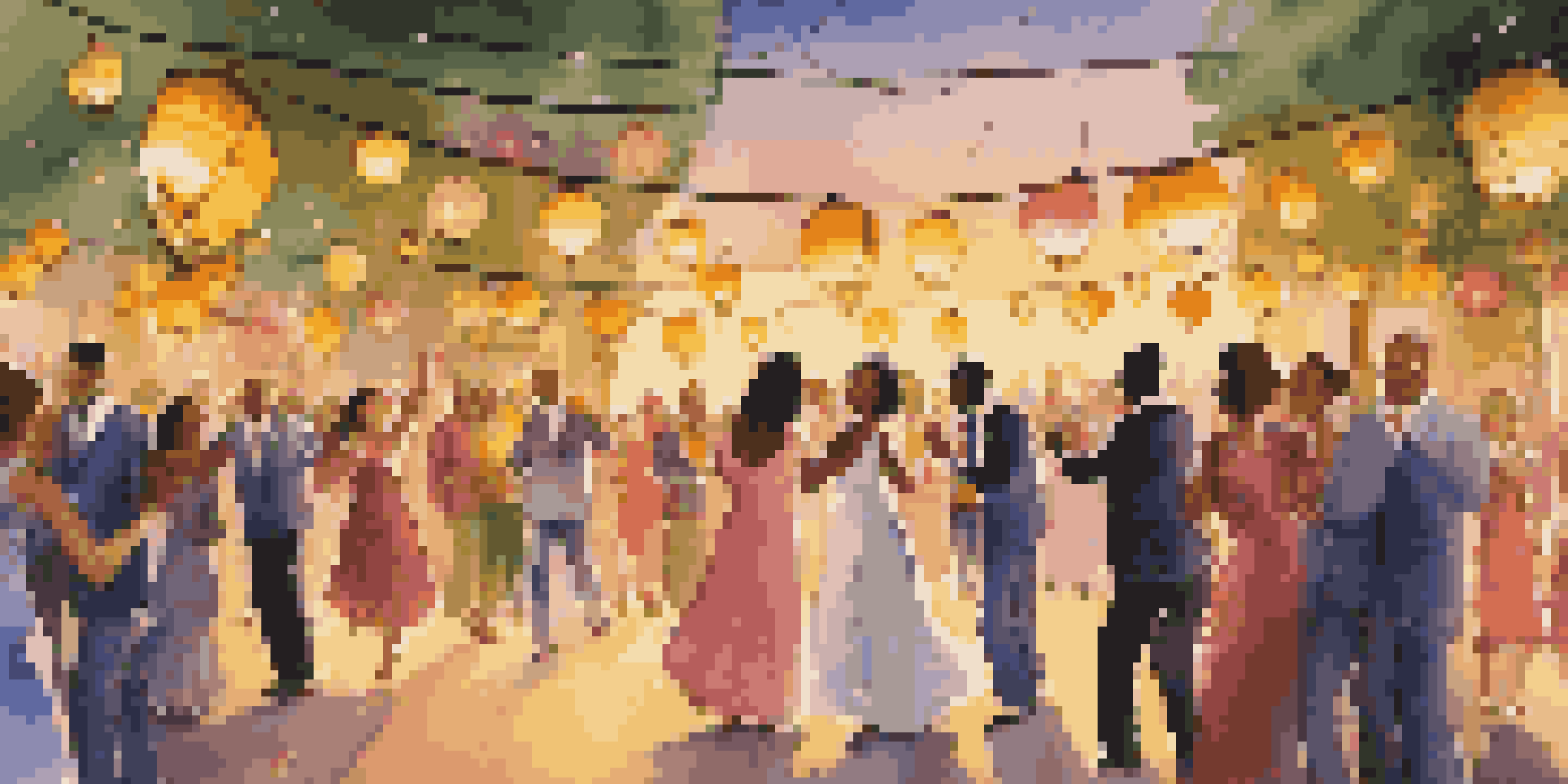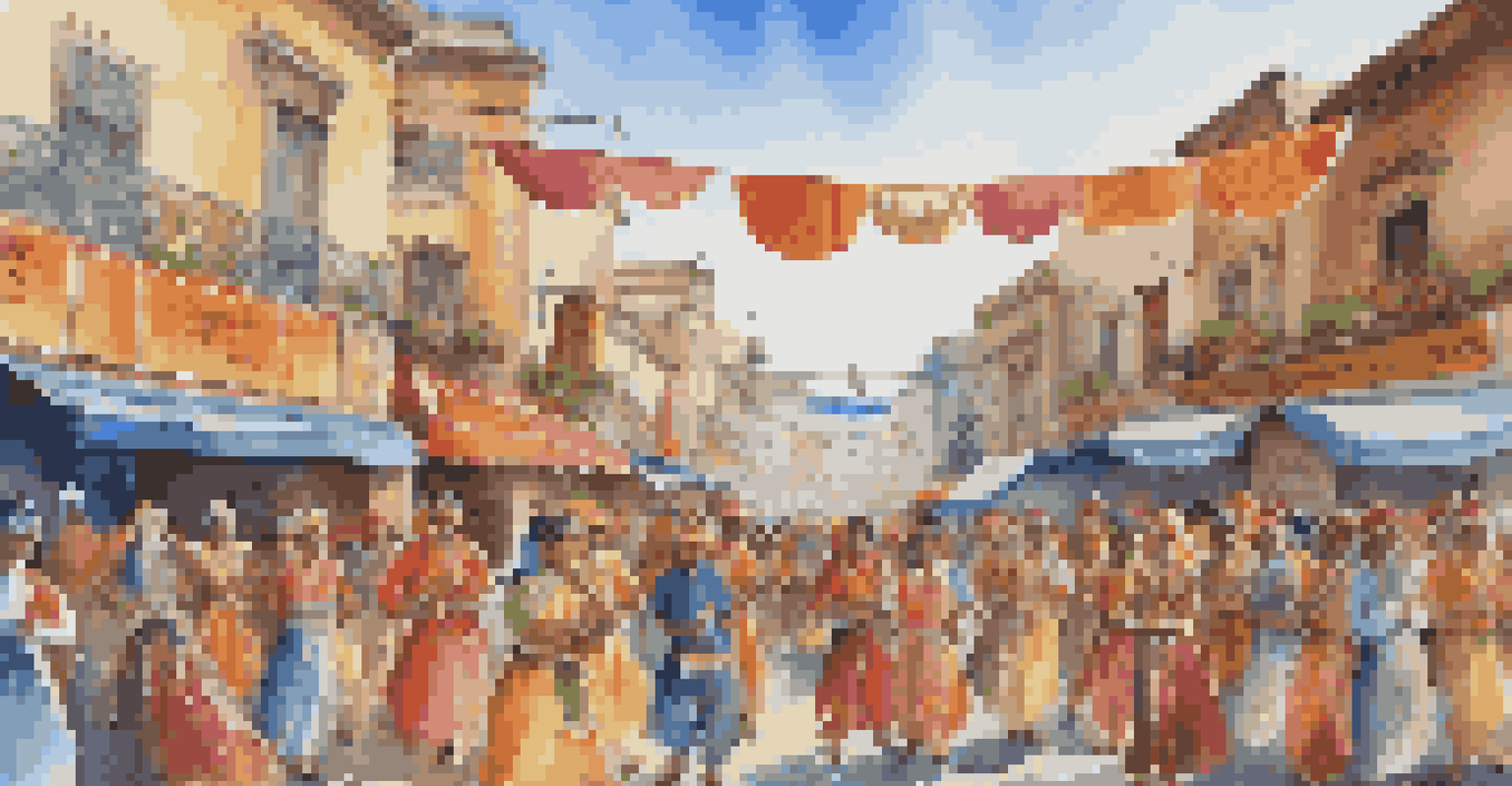The Role of Music in Celebrations and Cultural Traditions

Music as the Heartbeat of Celebrations
Music plays a vital role in celebrations, acting as the heartbeat that brings people together. From weddings to birthdays, it sets the mood and creates a shared experience among attendees. Just think about how a favorite song can instantly lift spirits and spark joyful memories, weaving a tapestry of emotion that ties us to those moments.
Music can change the world because it can change people.
In many cultures, music is integral to rituals and festivities, often symbolizing joy, love, or remembrance. For instance, during a traditional Indian wedding, the vibrant beats of the dhol drum energize the guests, encapsulating the excitement of the occasion. This connection between music and celebration fosters a sense of belonging and community, reminding us of our shared humanity.
Moreover, music can bridge generational gaps, allowing older and younger generations to connect through familiar tunes. When a grandparent dances to a song their youth, it creates a beautiful blend of nostalgia and happiness, reinforcing family bonds and cultural heritage. Ultimately, music enriches our celebrations, making them more memorable and meaningful.
Cultural Traditions Through Song and Rhythm
Every culture has its unique musical traditions that tell stories of its history and values. For example, the soulful sounds of African drumming not only entertain but also serve as a means of communication, conveying messages and emotions that words sometimes cannot express. This illustrates how music is deeply intertwined with cultural identity, passing down traditions through generations.

Take the example of the Chinese New Year, where traditional songs and lion dances create an atmosphere of joy and prosperity. The significance of these musical elements lies in their ability to evoke a sense of pride and continuity within a community. As people gather to celebrate, the music serves as a reminder of their shared heritage and the values they hold dear.
Music Unites Us in Celebrations
Music creates shared experiences that foster connections and enhance the joy of various celebrations.
Additionally, music can act as a unifying force in multicultural societies, blending different musical traditions into a harmonious celebration. Festivals often feature a mix of genres, allowing attendees to experience a tapestry of sounds that reflect the diversity of the community. This fusion of musical styles not only enriches the celebration but fosters understanding and appreciation among different cultures.
Rituals and Music: A Timeless Connection
Rituals often incorporate music to enhance their significance, marking important life events with sound. Whether it's a graduation ceremony accompanied by an uplifting anthem or a funeral service featuring a somber hymn, music provides a poignant backdrop that deepens the emotional experience. This connection underscores the universal role of music in expressing human emotions.
Where words fail, music speaks.
Consider the powerful impact of music during religious ceremonies. In many faiths, hymns and chants are integral to worship, helping congregants to connect with the divine and with one another. These musical expressions can evoke feelings of peace, reverence, and community, illustrating how music transcends mere entertainment to become an essential part of spiritual life.
As we navigate through life's milestones, the music that accompanies these rituals often becomes a cherished part of our memories. It’s not uncommon for people to associate specific songs with pivotal moments, creating a soundtrack to their lives that they can revisit in times of reflection. This lasting impact of music in rituals is a testament to its power to shape our experiences.
Celebratory Music: Genres That Unite Us
Certain musical genres have emerged as staples of celebration across various cultures, transcending borders and languages. Genres like reggae, salsa, and pop are often associated with joyful gatherings, encouraging people to dance and celebrate life. These sounds create an infectious energy that invites everyone to join in, reinforcing the idea that music is a universal language.
For instance, the upbeat rhythms of salsa music invite people to the dance floor, creating a lively atmosphere filled with laughter and movement. Similarly, reggae music, with its relaxing beats, often accompanies beach parties and outdoor festivals, promoting a sense of peace and unity among attendees. These genres not only entertain but also foster connections among diverse groups of people.
Cultural Identity Through Song
Musical traditions reflect cultural values and heritage, strengthening community bonds during festivities.
Moreover, the rise of global music festivals has highlighted the power of celebratory music to bring together audiences from all walks of life. Events like Coachella or Glastonbury feature artists from various genres, celebrating diversity while creating a sense of community. Through shared experiences of joy and excitement, these musical celebrations remind us of our collective human spirit.
The Role of Music in Community Gatherings
Community gatherings often rely on music to enhance social bonds, creating a sense of togetherness. Whether it's a local fair, a block party, or a cultural festival, live music encourages interaction among attendees, making the experience more enjoyable. This communal aspect of music fosters connections that may not have developed otherwise.
Consider the classic summer barbeque where a playlist of upbeat tunes sets the backdrop for laughter and conversation. The music serves as a catalyst for engagement, inspiring impromptu dance-offs or sing-alongs that break the ice among neighbors. These shared moments help to build a sense of belonging that strengthens community ties.
Additionally, community events featuring local musicians often celebrate regional talent and culture, allowing residents to take pride in their unique heritage. This not only supports local artists but also creates a vibrant atmosphere that attracts visitors and fosters cultural exchange. Through music, communities can celebrate their identity while welcoming others to join in the fun.
Emotional Resonance: Music and Memory in Celebrations
One of the most fascinating aspects of music is its ability to evoke memories and emotions associated with specific events. A particular song can transport us back to a cherished moment, whether it’s a first dance at a wedding or a family reunion. This emotional resonance is what makes music such a powerful force in our lives.
Research suggests that music activates areas in the brain associated with memory, making it a potent trigger for revisiting past experiences. For example, hearing a song from our childhood can instantly bring back feelings of nostalgia and joy, reminding us of simpler times. This connection to our past is particularly evident during celebrations, where familiar tunes can enhance the overall atmosphere.
Emotional Impact of Music
Music evokes memories and emotions, enhancing the significance of life events and celebrations.
Moreover, music can help us process our emotions during significant life events. During celebrations of life or memorials, specific songs can provide comfort and solace, allowing attendees to connect with their feelings. This emotional dimension of music reinforces its role as a vital part of our celebratory practices, reminding us of the power it holds in shaping our experiences.
Looking Ahead: The Future of Music in Celebrations
As technology continues to evolve, the landscape of music in celebrations is also changing. Virtual events, live streaming, and digital playlists have transformed how we connect through music, making it more accessible than ever. These advancements allow people to celebrate together, regardless of distance, fostering a sense of unity in a globalized world.
Consider how live streaming concerts have become popular during the pandemic, allowing fans to enjoy performances from the comfort of their homes. This trend has opened up new possibilities for celebrations, enabling individuals to participate in events that they might not have been able to attend otherwise. The ability to share these experiences online enhances our connection to one another, even from afar.

Looking ahead, we can expect music to continue playing a crucial role in how we celebrate and connect. Innovations in music technology, such as virtual reality concerts or interactive music experiences, will likely shape the future of celebrations. As we embrace these changes, the essence of music as a unifying force in our lives will remain, proving that no matter how we celebrate, the power of music will always be at the heart of it.